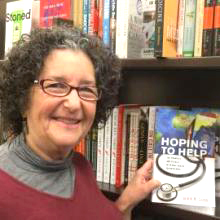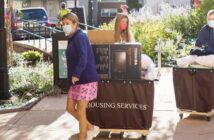
Judith Lasker (Courtesy of Lehigh University Website)
Judith Lasker, a professor of sociology and anthropology, entered the classroom of her Introduction to Global Citizenship class and asked how many students had gone on a volunteer trip abroad. A few hands flew up from across the room.
She then asked how many students would like to volunteer overseas. A few more students raised their hands.
Lasker said there are countless programs during which — for one week and a few thousand dollars — students can spend time volunteering in a developing country and subsequently “change (their) life.” But some of these programs don’t offer an orientation, provide little information on the culture of the region being served and are ultimately less effective than they could be. She said they sometimes unintentionally harm the local community.
This January, Cornell University Press released Lasker’s book, “Hoping to Help.” The book explores the “promises and pitfalls” of global health volunteerism and the industry of these medical missions, which can be a help or a detriment to the community they serve. Lasker said there have been large investments made to send volunteers to several areas of the world, and she questions the benefits of those donations.
Lasker critiqued some programs’ inabilities to understand the true needs of the hosts and the lack of sustainability of the programs instituted by the volunteers. In her opinion, both of these items reinforce a superiority complex among the volunteers, neglecting the culture and undermining the local people’s credibility and knowledge.
On the contrary, she said some programs can be helpful to communities if they are designed and executed effectively.
Jodeen Gemmel, a study abroad adviser and program manager, said Lehigh sponsors two programs that offer students an opportunity to serve abroad — SummerServe Antigua and Engineers Without Borders. Both of these are short-term programs, which Lasker classifies as programs fewer than six months long.
Lehigh recognizes some student-run organizations such as Global Medical Training, but students travel completely on their own in this program. Global Medical Training is a short-term service trip for undergraduate students focusing primarily on health care and medical training in developing countries. The program is offered at universities across the country.
In many of the testimonials on the website, students said the trip “changed their life” and provided an “unforgettable experience.”
Cynthia Pando, ’16, participated in a Global Medical Training trip to Nicaragua because she was interested in attending medical school. But she said medical schools do not believe these trips are a display of intelligence or ability.
“Now, medical schools don’t like seeing that,” Pando said, based on her own experience. “We’re not really helping them, it’s more of a vacation.”
As a fluent Spanish speaker, her experience was different. Pando said when interacting with patients, there is a disconnect if you cannot directly speak to them.
“You tend to look at the interpreter and not the patient,” Pando said. “There was more direct contact, more communication. They understand me. I understand them.”
Global Medical Training’s last trip was to the Dominican Republic this winter, and the club has been disbanded since then. The Brown and White reached out to the club, and members did not wish to comment because the organization is being revamped. Kelly Austin, a professor of sociology and director of the Health, Medicine and Society program, said several factors led to this decision.
“The national organization of (Global Medical Training) doesn’t adhere to what we consider to be ethical practices,” she said.
Austin said she was contacted to be an adviser for the club and accepted the position to ensure students were getting the knowledge and tools they needed to be successful. She thought in a few years she would help them reshape the club after promoting global awareness, but students continued on the wrong path. Austin decided to step down.
Austin hopes the club will reorganize with new priorities.
“Hoping to Help” outlines nine different principles for students to look for when choosing volunteer programs. Lasker said there are excellent programs that exist that benefit both the volunteers and the hosts.
Lasker was able to participate in programs in Haiti and Ecuador during her research. In Ecuador, she worked with a group that introduced electronic medical records to villages in the Amazon. She questioned whether any thought had gone into how the community would take to the idea and if any cultural issues were considered.
“The answer to that was, ‘Well, we’ve got the ‘gringo aura,’ so they’ll do whatever we say,'” Lasker said.
She said her experience on the trip was consistent with what the host staff she had interviewed said they disliked about volunteers. She said the hosts believe volunteers think their ideas are superior.
“The volunteers who come with the arrogance of ‘We know better, just do what we do back home,'” Lasker said. “Those are volunteers that they don’t like.”
Lasker said volunteers must be respectful and willing to learn from the staff in the area they are volunteering. She said a program that benefits both the host and the volunteers has the potential to be successful, and students should choose programs where there is staff present year round, and not one that solely caters to college student schedules.
Lasker urges students to ask questions and be cognizant of their actions. In the appendix of the book, she includes recommendations for prospective volunteers.
“We need to look not only for reviews that say ‘This was a lot of fun’ and ‘I learned a lot,’ but ‘Is this a responsible organization?'” Lasker said. “Don’t assume that every time Americans show up in a poor country that they’re helping.”





Comment policy
Comments posted to The Brown and White website are reviewed by a moderator before being approved. Incendiary speech or harassing language, including comments targeted at individuals, may be deemed unacceptable and not published. Spam and other soliciting will also be declined.
The Brown and White also reserves the right to not publish entirely anonymous comments.
2 Comments
Thank you.
I teach pre-health-professions students, and frankly a ridiculous number of them get involved (quite expensively) on these poverty-tourism pre-med rackets. We’ve got plenty of terrible poverty domestically, of course, so if you want to learn about providing healthcare to the unfortunate, just go shadow in any underfunded US hospital full of Medicaid patients. Privatized Medicaid, increasingly. Learn something about the healthcare shambles you’re about to go work in and what it means for people.
The misery of these programs doesn’t stop, incidentally, with the expense and the bwana-ism they teach the kids. The kids who can’t afford those trips start fretting that their apps won’t be competitive, so they borrow and spend money they don’t have to go on some travel agent package to eyeball poor sick people on the other side of the world.
If you’re thinking about going to med school, please forget about the traveling to see faraway extremely poor sick people with terrible healthcare and deep ignorance about their own bodies. We have millions right here. And if you’re interested in global public health, then understand that this isn’t something you pick up over spring break. Find a good academic program and start there.
This is one of the best blog in which you discuss volunteer trips issue. In Volunteer program related to tips mainly I face lack of problem with volunteer. Your suggestion is best for me.